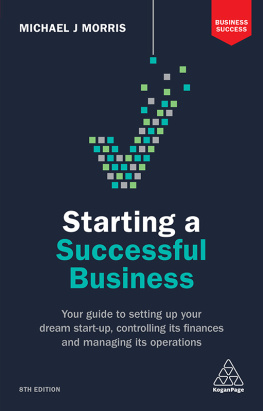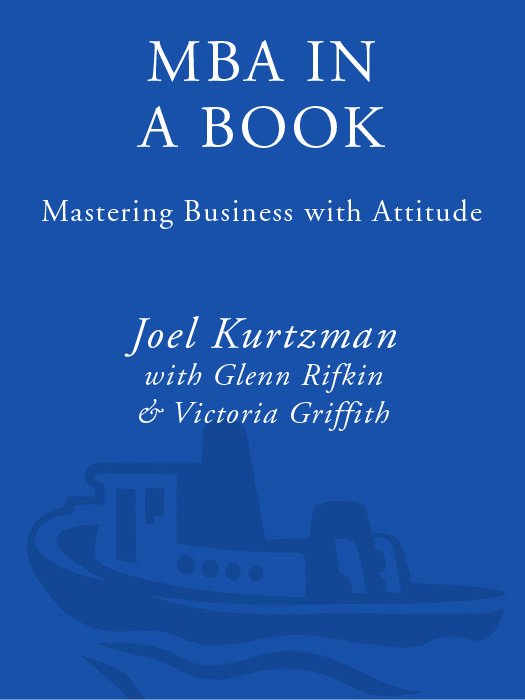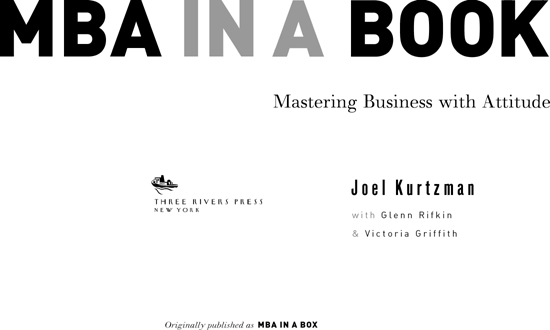ALSO BY JOEL KURTZMAN
How the Markets Really Work
Radical E
(with Glenn Rifkin)
Thought Leaders:
Insights on the Future of Business
The Death of Money:
How the Electronic Economy Has Destabilized the
Worlds Markets and Created Financial Chaos
The Decline and Crash of the American Economy
Futurecasting
RCDC:
Regional Cooperation Among Developing Countries
To my wife, Karen, with love and admiration.
CONTENTS
1. Innovation
How Breakthroughs Happen
2. Sustainability and the Environment
A Business That Makes Nothing but Money Is a Poor Kind of Business
3. Finance and Accounting
Were Not in Kansas AnymoreGetting Real About Numbers and What They Mean
4. Strategy
Make Sure You Take the Right Fork in the RoadOn the Importance of Strategic Direction
5. Managing
Is Getting Paid for Other Peoples Home Runs
6. Human Resources
Why Brains Trump Brawn
7. How to Be a Leader
and Live to Tell About It
8. Marketing
Find Out What They Want and How They Want It and Give It to Em Just That Way
9. Communication
A Fool May Talk, but a Wise Man Speaks
10. Theres Many a Slip Twixt the Cup and the Lip
Good Ideas Gone Awry
INTRODUCTION
W hen I was the editor of the Harvard Business Review, I had a recurring fantasy (no, not that kind of fantasy). In my fantasy the dean of the Harvard Business Schoolmy bosswould call me into his dimly lit, book-lined, wood-paneled office. He would sit me down, draw the shades, and lock the door. He would pace. In some version of the fantasy he would wring his hands, shrug, hem and haw. In others he would offer me a glass of port and a fine cigar. (I liked the second version better.)
In that fantasy, the deanan enormous man with a raspy, conspirators voicewould say to me that my job at the Harvard Business Review was to make business appear difficult to the readers. Dont publish any smart-aleck articles about how Andrew Carnegie or Henry Ford never finished grammar school or how Bill Gates dropped out of college. Publish articles that talk about how difficult business is, how complicated it is to read a balance sheet, how many times you have to run a regression analysis to really understand your market, how the problems of strategy are intractable. Make it all seem hard, he would tell me with a scowl.
Hard? Why? I would ask rather meekly.
Why? Why? he would repeat, eyes narrowed into tiny slits. Did you really ask me why, you nincompoop?
Yes, I would say, clearing my throat. I did.
Because it is. And besides, what would happen to our business if your readers thought business wasnt all that difficult? That any imbecile could do it? What do we do then? the dean would bellow. We sell business education, business books, business magazines, online business content, business videos, business case studies, lectures, degrees, research, class notes. The whole shebang. If people thought business was easy, wed be wiped out. Finito. End of story.
My fantasy did not go on much after that. And in truth, I have great admiration for the dean, the school, the students, and the faculty. The Harvard Business School is a tremendous institution, and it has done an enormous amount of good for thousands of people and institutions on many, many levels. Even so, as I think about business, I have come to understand that my fantasy was in some ways right as well as wrong.
It was wrong because business isnt easy. At least it isnt at the moment. The forces governing competition today are very difficult to navigate. They are global, technological, financial, and human. The cycles of growth and declinewhich many pundits in the 1990s said were no longer applicableare back in full force. In fact, the same itemsglobalization and technologythat people said had ended the business cycle are now being viewed as making it worse. Globalization and technology, it is now said, have destroyed the ability of many companies to price their goods and services at a premium, which is hurting profits globally. (In the 90s, the same phenomenon was viewed the other way around. Globalization and technology would check inflation and keep prices low so that cost-conscious consumers would continue buying, fueling what some people at the time called the long boom.)
But thats not all.
The forces governing business are largevery large. They range from sudden, short-term shifts in consumer buying habitsa two-season-long denim craze, a two-year Hula Hoop frenzy, a four-year-long cigar fad, for exampleto slower, medium-term changes, such as the decade-long shift from conservative business attire to clothes for casual Fridays and then to clothes for (as my children might say) whatever.
And then there are the longer-term changes on top of these shorter-term shifts. In many countries since the 1960s there has been a slow growth of citizen movements (nongovernmental organizations, protest and pressure groups, business-oriented religious groups, human rights groups, antiglobalization groups, animal rights groups, and so on). Over the last three or four decades, these groups have become very sophisticated, professional, and well organized. Many are well funded and highly strategic in their approach. Many of their leaders have degrees from elite business and professional schools. These groups employ carefully thought-out strategies to achieve their overall goals. They ally themselves with political parties and labor groups.
I have had direct experience with several of these groups in the United States and in Europe. The leader of a French antiglobalization group told me that his organization would never compromise with business on their aims because they have a greater political agenda. The groupwhose leaders include some well-respected French journalists and university professorstold me they will not negotiate. Their aim was to restrict outbound French investment (keep French jobs in France), create tougher environmental restrictions, and limit non-French cultural imports (movies, music, and books), among other things. The leader of the group said he was against markets and against American-style capitalism. When this group plans a demonstration, tens of thousands of people show up. As a result, the politicians listen and companies must cope.
Another group, an American environmental organization, explained to me why it had mounted a boycott against a certain Japanese automaker. The carmaker, the groups leader explained, was actually innocent when it came to the environmental offense in question. It did, however, have significant investment from, and shared directorships with, another Japanese company that was clear-cutting hardwood forests in Indonesia. By putting pressure on one company it could exert influence over the other due to their shared governance structure, the environmental leader explained. Over the last twenty-five years this organization has come to know as much about business as the best stock market analysts and investment bankers do.
There are other large, long-term changes as wellnew technologies (broadband, for example) where the business case has been obvious for decades but the correct business model has yet to materialize.












